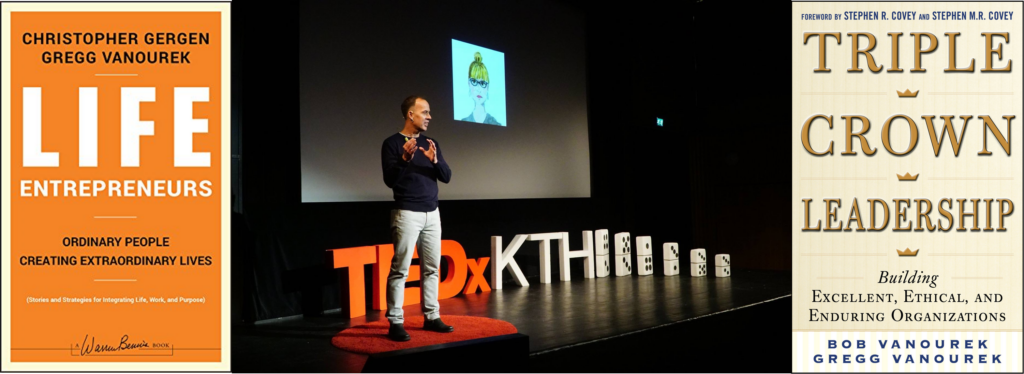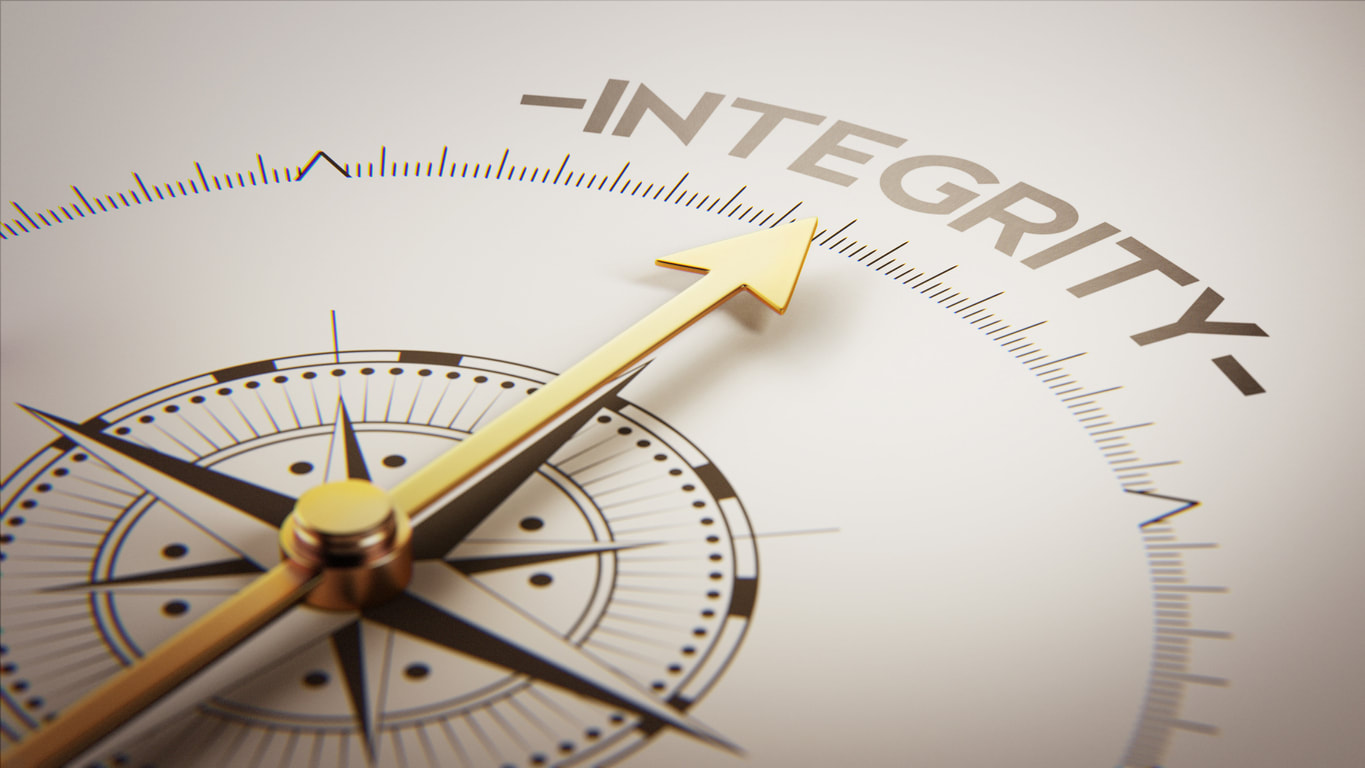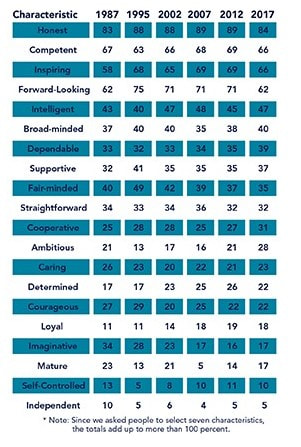We face a barrage of challenges these days: rapid change, a barrage of demands on our attention, tension between work and home, and more. There’s one meta-skill that shapes how we respond to all these challenges: self-leadership.
Without it, we cannot sustain ourselves for long.
Leading self may be obvious, but it’s far from easy. We neglect it at our peril.
The task of leading self is the task of a lifetime. Here are ten keys to self-leadership:
1. Healthy Habits.
When we are leading self well, we develop an energizing rhythm of self-care. It includes the “fundamentals” that many of us take for granted: good nutrition, vigorous exercise, consistently good sleep, breaks during the day, and regular check-ins to take stock of the big picture. Too often we protest that we don’t have time for such things. That is shortsighted. It’s when times are tough that we need these habits the most. Without them, we unravel and develop bad habits.
2. Inner Life.
Today, we are so consumed with daily obligations and distractions that we can lose ourselves in them. Our inner voice is drowned out by noise and shuffle. John W. Gardner once wrote, “By midlife, most of us are accomplished fugitives from ourselves.” We numb ourselves with compulsive smartphone use and binge-watching. In the process, we are rewiring our brains and sabotaging our ability to engage in deep reflection and work. Knowing ourselves means discovering our:
- Purpose: our reason for being (or what infuses our life with meaning and significance)—including a sense of why we do what we do, and why we want to lead
- Values: what we value most in life (and the behaviors that manifest those things)
- Strengths: what we are good at
- Passions: what we get lost in, or what fills us with energy
- Vision of the good life
Often, it takes time to discover these foundational elements. They become clearer over time if we “listen to our life,” as Parker Palmer encourages. We must build these essentials into our life and work. It helps to share them with loved ones about for input, support, connection, and follow-through.
“All you have to do is to pay attention; lessons always arrive when you are ready, and if you can read the signs, you will learn everything you need to know in order to take the next step.” -Paulo Coelho, Brazilian novelist
3. Authentic Integrity.
When we act with integrity, we are not only honest, truthful, and trustworthy; we are also whole. In today’s world, it is easy to live what Parker Palmer calls a “divided life,” with a chasm between how we live and who we really are.
“One man cannot do right in one department of life whilst he is occupied in doing wrong in another department. Life is one indivisible whole.” -Mahatma Gandhi, Indian lawyer and transformational leader
Instead of dividing ourselves, we must integrate all aspects of our self into one coherent whole. In doing so, we must be who we really are, not a projection of something crafted to please or impress others. In our book, LIFE Entrepreneurs, Christopher Gergen and I called this “authentic integrity”: integration of all aspects of our lives in a way that coheres with our true nature. When we live this way, we develop what Palmer calls a “hidden wholeness.”
“Wholeness does not mean perfection;
it means embracing brokenness as an integral part of life.”
-Parker Palmer, author and educator
4. Brutal Honesty.
Our brains are wondrous creations, with incredible capacity for sensing, thinking, remembering, learning, calculating, pattern-spotting, imagining, creating, associating, dreaming, and regenerating cells, all while subconsciously regulating our internal bodily functions and sleep.
But our brains are prone to subconscious shortcuts and biases and we are exceptionally good at rationalizing our behavior, whether good or bad. In short, we are masterful at deceiving ourselves and explaining hard truths away.
Are we needy for recognition or approval? Desperate to impress? Losing ourselves in work? Hiding our brokenness? None of us is perfect, but without brutal honesty, we will not be able to break out of unproductive patterns that cause pain for us and others.
“If you want to be successful, you must respect one rule:
never lie to yourself.”
-Paulo Coelho, Brazilian novelist
5. Inspiration.
There is much to be concerned about in the world today. Just look at the headlines. Sometimes we should switch off the frenzied feeds of doom and gloom and turn our gaze elsewhere: What fills us with life? What makes us crackle with energy? What lifts us up? Inspiration can come from different sources: Love. Dreams. Connection. Adventure. Opportunity. Awe and wonder. The coming of spring. The hope of healing. The sense of having helped.
What inspires you? Have you lost touch with it?
6. Courage.
We tend to put courage on a pedestal. Typically, we think of people suddenly reinventing their lives or leaping into the line of fire. We think of fearlessness. In truth, courage does not come without fear. We show courage when we act even though we are afraid.
“Feel the fear and do it anyway.”
-Susan Jeffers, psychologist and author
Courage is a prerequisite for everything that is necessary and valuable in life. What use is a good idea not launched into the world? A conviction not defended? A precious relationship not fiercely guarded? A talent that stays backstage? A manuscript that never ships?
It is not enough to have convictions: we must act on them, even when–especially when—they are hard. Courage is not always about acts of heroism. It is much more often the day-to-day hard work of showing up, getting started, putting ourselves out there, doing our best, and persisting. It requires mucking through the swamp of uncertainty.
7. Wholeheartedness.
Too often, we live and lead just from our head. We think, reason, assess. Pros and cons. Cost/benefit. We avoid the mysterious territory of the heart. Brené Brown reminds us that we fall into the trap of trying to impress others, with fear and shame driving that fool’s errand.
The alternative, she says, is vulnerability, and embracing what she calls the “gifts of imperfection,” which can lead to connection, joy, and wholeheartedness.
“Connection is why we’re here…. Courage starts with showing up and letting ourselves be seen…. True belonging only happens when we present our authentic, imperfect selves to the world.” -Brené Brown, researcher and author
8. Significance.
Jeff Spadafora talks about achieving a level of success in his life with a family, prestige, and a big home in the mountains—and yet feeling surprisingly unsettled. Over time—with an increasing disconnect between his life and his values, driven by his focus on ego and accumulation—that feeling grew into what he calls “smoldering discontent.”
In his book, HalfTime, Bob Buford wrote about the struggle that can occupy much of our lives for those fortunate enough not to be consumed with survival matters like disease, hunger, and poverty. If we are fortunate, perhaps we can transform that struggle into success. Too many people stop there, as if wealth and status were the point of life. Buford points instead to a longer journey: from struggle, to success, to significance. Significance ensures that our success matters, that we have a legacy beyond self-aggrandizement and accumulation. A legacy of service and impact.
9. Serenity.
Many people today exist in a precarious state, from the cumulative effects of stress, poor sleep, and burnout. For starters, we need to build renewal into our days. Despite our willpower and ambitions, there are limits to our energy. Without exception, we need good habits of rest and renewal.
“In life itself, there is a time to seek inner peace, a time to rid oneself of tension and anxiety. The moment comes when the striving must let up, when wisdom says, ‘Be quiet.’ You’ll be surprised how the world keeps on revolving without your pushing it. And you’ll be surprised how much stronger you are the next time you decide to push.” -John W. Gardner, public official and political reformer
At a deeper level, we need “sanctuary” in our lives: places and practices of peace that restore our hearts. Places of quiet and tranquility. Together, renewal and sanctuary can lead to serenity. Beyond the striving, beyond the chase, beyond the willfulness, there is an acceptance, a yielding, a comfort with the present moment and a willingness to see things for what they are and ride with the flow of life. The serenity beyond the stress and struggle.
10. Soulfulness.
Leading self ultimately takes us beyond the self. We must look to the “far horizon,” as Dag Hammarskjöld urged, not just at the place where we are walking. We must tame our egos and find a deep and abiding humility about the vastness of our universe and a shuddering gratitude for our place in it. This is the place of soulfulness.
“You don’t have a soul, Doctor.
You are a soul.”
-Walter M. Miller Jr., A Canticle for Leibowitz
This is the place where we pause and get quiet, and instead of pushing and fighting, we sit and listen. Sometimes, with grace, we open up a space in our lives where we can begin to make out a call—quiet but steady—that had been sounding all along. Wrapped up in our own struggles and dramas, we were too preoccupied to notice, too consumed to hear.
If we stay with it, really listening, we can begin to fathom its depth.
In the vast well of soulfulness, we come to realize that our lives are not about us alone. Our lives are vessels of connection—a precious, sacred, and mysterious gift.

Tools for You
Related Articles
+++++++++++++++++
Gregg Vanourek is a writer, teacher, and TEDx speaker on personal development and leadership. He is co-author of three books, including LIFE Entrepreneurs: Ordinary People Creating Extraordinary Lives (a manifesto for living with purpose and passion) and Triple Crown Leadership: Building Excellent, Ethical, and Enduring Organizations (a winner of the International Book Awards). He has worked for market-leading ventures and given talks or workshops in 8 countries. Check out his Crafting Your Life & Work online course or get his monthly newsletter. If you found value in this article, please forward it to a friend. Every little bit helps!













